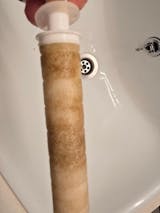Introduction
Phycocyanin, a blue phycobiliprotein extracted from microalgae such as spirulina (Arthrospira platensis), has become known as a holistic health supplement with anti-inflammatory, antioxidative and immunomodulating properties. This protein is the subject of extensive scientific research and is used in the medical and nutritional fields due to its unique bioactive properties.

1. Historical background and origin
Spirulina has been known and used in several cultures for centuries, most notably by the Aztecs in Mesoamerica and people around Lake Chad in Central Africa, where it was collected from lakes. In the 20th century, modern science began to explore the nutritional value of spirulina, and in particular its content of phycobiliproteins such as phycocyanin. Over the years, phycocyanin has become an integral part of the health food industry, and recent research points to its potential as a therapeutic agent.
2. Chemical composition and structural details
Phycocyanin consists of alpha and beta peptide chains attached to chromophores, known as phycocyanobilin. These chromophores give phycocyanin its blue color pigment and make it absorb light efficiently in the red and infrared range, which is crucial in the photosynthesis process in spirulina. The special structure, with a tetrapyrrole ring, resembles the structure of bilirubin, which gives phycocyanin its strong antioxidative properties. These molecular properties make it effective in neutralizing reactive oxygen species (ROS) and protecting cells from oxidative stress.
3. Therapeutic properties of phycocyanin
Phycocyanin has a number of scientifically proven health benefits, and the following sections will cover the most significant properties in detail, supported by clinical and laboratory-based studies.
3.1 Anti-inflammatory properties
Phycocyanin has strong anti-inflammatory properties by inhibiting enzymes such as COX-2 and inducible nitric oxide synthase (iNOS), which are central to inflammatory processes. This inhibits the release of cytokines such as TNF-α and IL-6, which makes phycocyanin effective for the treatment of chronic inflammatory conditions such as arthritis and inflammatory bowel disease (IBD). Animal and in vitro studies support these findings, making phycocyanin a promising candidate for therapeutic use in the treatment of inflammatory diseases.
3.2 Antioxidant activity
As a powerful antioxidant, phycocyanin protects cells against oxidative stress. Phycocyanin also activates the body's antioxidant systems, including enzymes such as superoxide dismutase (SOD), glutathione peroxidase (GPx), and catalase. These properties potentially have a protective effect against oxidative damage, which is associated with diseases such as cancer, cardiovascular disorders and neurodegenerative diseases such as Alzheimer's disease.
3.3 Neuroprotection
Phycocyanin also has neuroprotective properties that may be valuable for the treatment of neurodegenerative diseases. It has been shown to reduce oxidative stress and inflammation in the brain, as well as to inhibit apoptotic pathways that protect nerve cells from damage. Studies have shown that phycocyanin can support the increase of BDNF levels, a neurotrophic factor that is important for the growth and survival of neurons, and may have application in the treatment of diseases such as Alzheimer's and Parkinson's.
3.4 Immunomodulation and anti-viral activity
Another remarkable property of phycocyanin is its ability to stimulate the immune system. Phycocyanin promotes the production of white blood cells and interferons, proteins that play a key role in defending the body against infections. Phycocyanin can also reduce allergic reactions by modulating the immune response to allergens. This makes it a potential candidate for the treatment of autoimmune diseases and allergies.
4. Quality and extraction methods
To ensure maximum bioactivity, phycocyanin is best extracted from fresh spirulina using non-solvent-based methods, such as cold extraction at low temperature. This preserves the protein's structure and active properties. PHYCOMANIA and similar manufacturers use methods that maintain the natural form of phycocyanin and ensure high purity and effectiveness. It is also important to note that the color of a phycocyanin product does not necessarily reflect its concentration or bioactivity, as pH, matrix, and light absorption also come into play.
5. Clinical studies and future research potential
A number of clinical studies and trials have shown promising results for phycocyanin's effectiveness in the treatment of inflammatory conditions, immune stimulation, neuroprotection, and as a complementary treatment to conventional cancer treatment. Ongoing research is also investigating the role of phycocyanin in metabolic health and blood sugar regulation, as well as its potential as a supportive treatment for neurodegenerative diseases.

6. Recommendations for dosage and use
It is recommended that liquid phycocyanin be taken on an empty stomach for maximum bioavailability. Typical dosage for PHYCOMANIA 10K, a highly concentrated phycocyanin product, varies between 10 ml as a daily maintenance dose and up to 40 ml for intensive regimens that may be useful for athletes or during periods of high risk of infection. The dosage can be adjusted according to individual health needs.
7. Safety and side effects
Phycocyanin is considered generally safe for most adults, but as with all dietary supplements, pregnant women, breastfeeding women and people with allergies should consult a healthcare professional before use. Some people report mild side effects such as stomach upset, but this is rare.
8. Future research areas
Research on phycocyanin is continually expanding, and several areas are worthy of deeper exploration, including its role in cancer therapy, neuroprotection, metabolic health, and as a supportive treatment for chronic diseases. There is also growing interest in exploring synergistic effects when phycocyanin is combined with other bioactive substances or drugs.
Conclusion
Phycocyanin is a natural and effective supplement that offers a variety of health benefits, from anti-inflammatory and antioxidative properties to immune support and neuroprotection. With its high bioavailability and research-backed effects, phycocyanin can play an important role in future integrated healthcare, both as a dietary supplement and as a complementary treatment.

